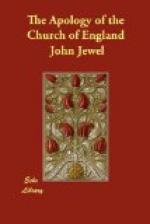And although the popes had never hitherunto leisure to consider diligently and earnestly of these matters, or though some other cares do now let them, and diverse ways pull them, or though they count these to be but common and trifling studies, and nothing to appertain to the Pope’s worthiness, this maketh not why our matter ought to seem the worse. Or if they perchance will not see that which they see indeed, but rather will withstand the known truth, ought we therefore by-and-by to be accounted heretics because we obey not their will and pleasure? If so be, that Pope Pius were the man (we say not, which he would so gladly be called), but if he were indeed a man that either would account us for his brethren, or at least would take us to be men, he would first diligently have examined our reasons, and would have seen what might be said with us, what against us; and would not in his bull, whereby he lately pretended a council, so rashly have condemned so great a part of the world, so many learned and godly men, so many commonwealths, so many kings, and so many princes, only upon his own blind prejudices and fore-determinations—and that without hearing of them speak or without showing cause why.
But because he hath already so noted us openly, lest by holding our peace we should seem to grant a fault, and specially because we can by no means have audience in the public assembly of the general council, wherein he would no creature should have power to give his voice or to declare his opinion, except he be sworn, and straitly bound to maintain his authority (for we have had good experience hereof in the last conference at the council at Trident; where the ambassadors and divines of the princes of Germany, and of the free cities, were quite shut out from their company. Neither can we yet forget, how Julius the Third, above ten years past, provided warily by his writ that none of our sort should be suffered to speak in the council,




